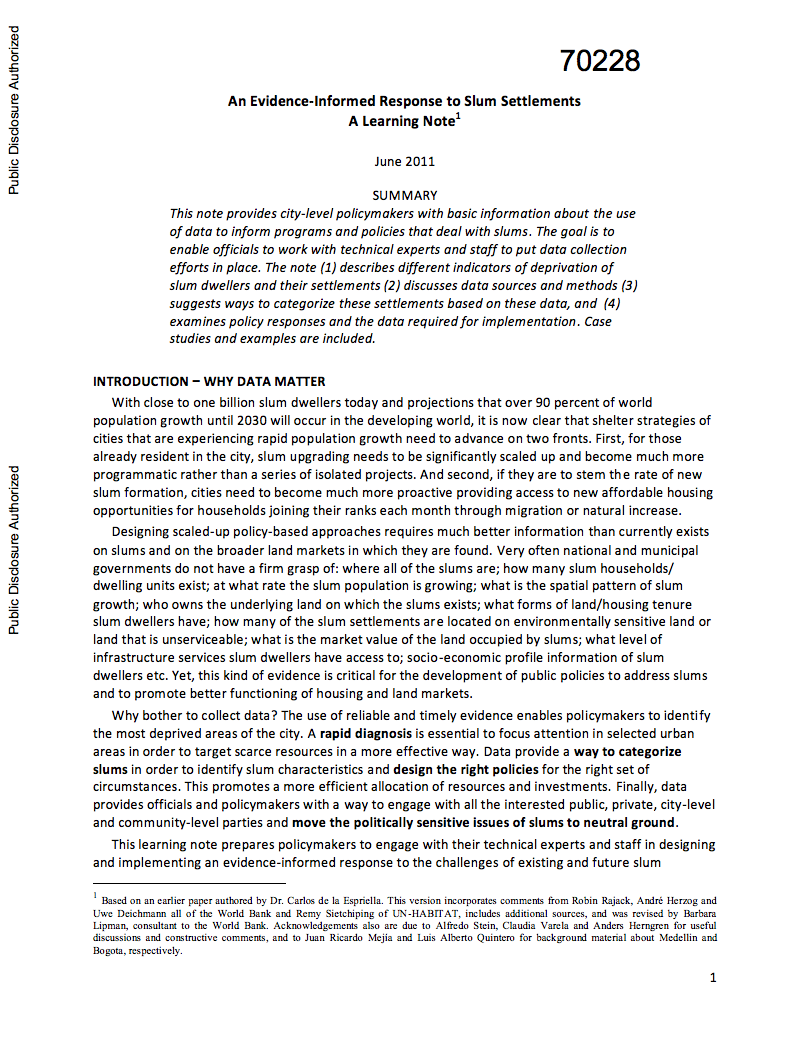The World Bank is a vital source of financial and technical assistance to developing countries around the world. We are not a bank in the ordinary sense but a unique partnership to reduce poverty and support development. The World Bank Group has two ambitious goals: End extreme poverty within a generation and boost shared prosperity.
- To end extreme poverty, the Bank's goal is to decrease the percentage of people living on less than $1.25 a day to no more than 3% by 2030.
- To promote shared prosperity, the goal is to promote income growth of the bottom 40% of the population in each country.
The World Bank Group comprises five institutions managed by their member countries.
The World Bank Group and Land: Working to protect the rights of existing land users and to help secure benefits for smallholder farmers
The World Bank (IBRD and IDA) interacts primarily with governments to increase agricultural productivity, strengthen land tenure policies and improve land governance. More than 90% of the World Bank’s agriculture portfolio focuses on the productivity and access to markets by small holder farmers. Ten percent of our projects focus on the governance of land tenure.
Similarly, investments by the International Finance Corporation (IFC), the World Bank Group’s private sector arm, including those in larger scale enterprises, overwhelmingly support smallholder farmers through improved access to finance, inputs and markets, and as direct suppliers. IFC invests in environmentally and socially sustainable private enterprises in all parts of the value chain (inputs such as irrigation and fertilizers, primary production, processing, transport and storage, traders, and risk management facilities including weather/crop insurance, warehouse financing, etc
For more information, visit the World Bank Group and land and food security (https://www.worldbank.org/en/topic/agriculture/brief/land-and-food-security1
Resources
Displaying 2701 - 2705 of 4907Colombia - Programmatic Strategic Engagement on Public Sector Management and Governance : Concept Note
This concept note presents the strategic
engagement of the World Bank in the areas of public sector
management and governance in Colombia. It describes the
short and medium term approach through which the Bank will
provide support to the country on those areas of reform, as
well as their links and synergies with other sectors
activities. It also provides a summary of the Bank's
public sector management and governance recent activities
The Gambia : An Assessment of the Investment Climate
The situation in The Gambia is a good
example of the many challenges small states have to deal
with. The country is faced with institutional capacity
constraints and due to a narrow resource base and a small
domestic market, its production base and exports show little
diversification. Like other small states, the country tends
to rely heavily on external trade and foreign investment to
overcome its scale and resource limitation, increasing its
Africa Energy Poverty : G8 Energy Ministers Meeting 2009
Worldwide, about 1.6 billion people lack
access to electricity services. There are also large
populations without access in the poorer countries of Asia
and Latin America, as well as in the rural and peri-urban
areas of middle income countries. However large-scale
electrification programs that is currently underway in
middle income countries and the poor countries of Asia will
increase household electricity access more rapidly than in
An Evidence-Informed Response to Slum Settlements : A Learning Note
This learning note prepares policymakers
to engage with their technical experts and staff in
designing and implementing an evidence-informed response to
the challenges of existing and future slum settlements. To
that end, the note discusses a set of indicators and data
analysis techniques needed in the identification and
characterization of slums as well as relevant lessons and
examples. In addition, the noted discusses the data
South Kordofan : A Growth Diagnostic
This report attempts to diagnose
existing constraints and prospects for growth in
people's incomes in South Kordofan. Given the breadth
and depth of difficulties facing the state, the focus is on
identifying the key areas of reform, or binding constraints,
to growth. There is a combination of extremely low social
returns, the prevalence of government and market failures,
the weak investment climate and the limited access to







